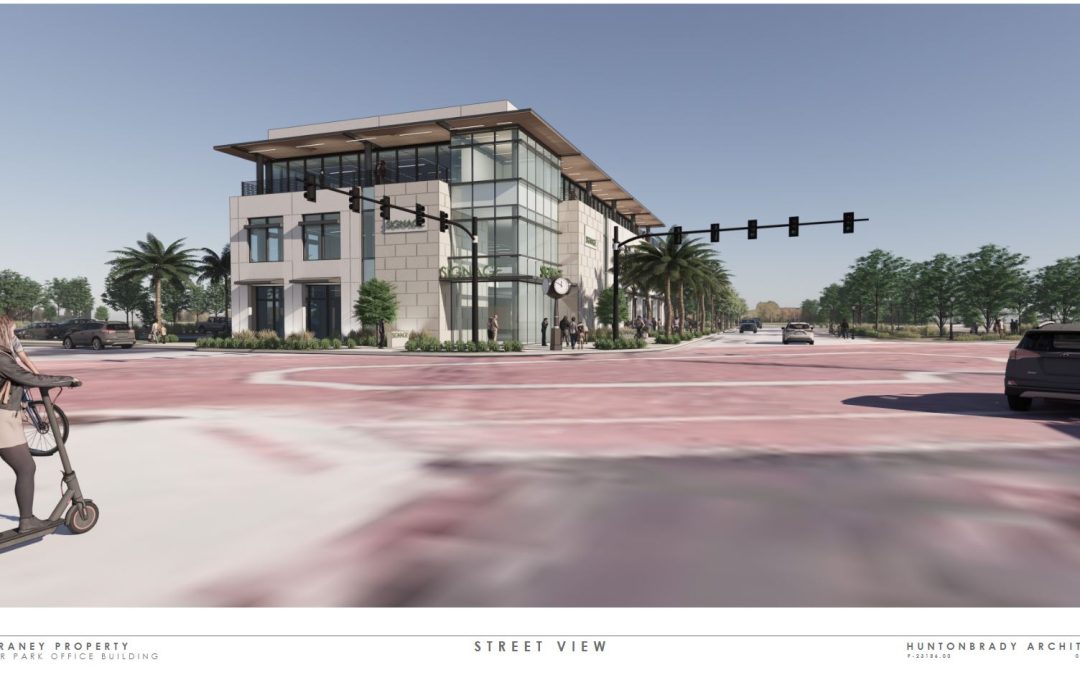
by Beth Kassab | Jan 19, 2024 | City Commission, News, Orange Avenue Overlay, Uncategorized, Zoning and Development
OAO Board approves plans for office building next to Seven Oaks Park
The city tried to buy the parcel along Orange Avenue and Denning Drive that was owned by Bank OZK, but lost out to a warehouse developer
Jan. 18, 2024
By Beth Kassab
The Orange Avenue Overlay Appearance Review Advisory Board considered plans for one of the most talked about properties in Winter Park last year — the wedge-shaped parcel that city commissioners attempted multiple times to purchase to add on to Seven Oaks Park.
The property was owned by Bank OZK and after the city’s offers were rebuffed, the vacant land was sold to warehouse developer and Winter Park resident Steven McCraney, who wants to build his company’s headquarters there.
McCraney spoke at the meeting and said he was initially working with Bank OZK to develop the property jointly — a plan that started 18 months ago, long before the city made its first offer last year.
“They decided they wanted to sell it at kind of the last minute and we were glad to be the group they decided to sell it to,” he said.
He said he’s excited about the project and expects it to “raise the bar” in the new special Orange Avenue Overlay area, which has special zoning and development standards designed to improve pedestrian access and architectural quality in the area near Orange Avenue and U.S. Highway 17-92.
The board made several recommendations for the development such as planting oak trees rather than palm trees along the main corridors for extra shade. Ultimately, they recommended approval by a 3-0 vote. Brian Canin, Tonya Mellen and Wade Miller voted in favor. Andrew Krecicki recused himself from the vote because he works for HuntonBrady Architects, which is involved in the McCraney project.
WinterParkVoiceEditor@gmail.com
To comment or read comments from others, click here →
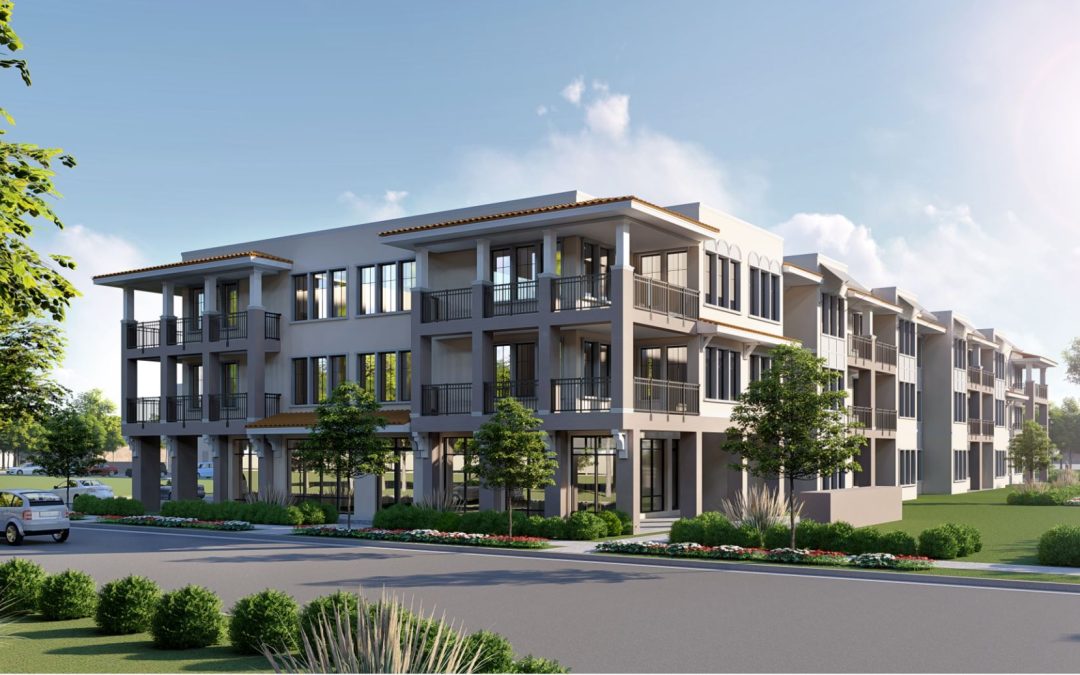
by Beth Kassab | Jan 18, 2024 | City Commission, News, Uncategorized, Zoning and Development
In close vote, P&Z board approves Rollins faculty housing project
Neighbors slam proposed architecture and say parking is inadequate
Jan. 18, 2024
By Beth Kassab
A proposed 48-unit apartment building to serve as workforce housing for Rollins College faculty and staff skidded out of a Planning & Zoning Board meeting with new conditions attached after an onslaught of complaints from residents at the nearby Douglas Grand condominiums.
The board voted 4-2 to recommend approval to the City Commission, which will consider the project next week. Jim Fitch, Vashon Sarkisian, Alex Stringfellow and David Bornstein voted yes with the added condition of restricting the number of parking passes per unit based on the number of bedrooms as well a requirement that Rollins help add on-street parking along Welbourne Avenue. Melissa Vickers and Warren Lindsey voted no.
Residents who live in the Douglas Grand and elsewhere said the project would add too many units to their neighborhood without adequate parking. Several people criticized the proposal’s architecture, wood frame construction and questioned the impact of what they called “subsidized housing” on their own property values.
Some who spoke accused the city of bowing to any request made by Rollins.
“I think we can agree this evening that if any other developer walked in to staff’s office and made a request for double units and only 77% of required parking with a noncompatible building, I think we can all agree that never would have made it to your agenda,” one speaker said. “But here we are tonight.”
Rollins President Grant Cornwell defended the project as central to the liberal arts college’s mission of providing students an intimate and quality experience with faculty and staff integrated into campus life.
He said younger, tenure-seeking faculty can’t afford to live in Winter Park and commute times can be an hour.
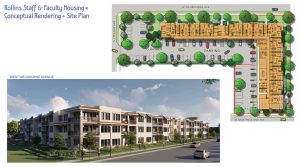
A rendering shows a faculty and staff apartment project proposed by Rollins College.
“This emerged as a way to fill a need,” he said. “Especially by younger faculty and a generation where they would like to get rid of a reliance on cars and walk to work and shopping.”
City code would typically require 124 parking spaces for the development as proposed: 2.5 spaces per unit plus four spaces for the coffee shop and bookstore. But Planning Director Jeff Briggs said the city has allowed other nearby projects to build just two spaces per unit because of the availability of on-street parking and the potential to add more on-street parking. As a result, the staff endorsed Rollins’ plan to build 97 spaces for the project.
The college is partnering with developer Alan Ginsburg on the one, two and three-bedroom units. The site along New England and Welbourne avenue is currently home to buildings known as the Dan Hunter apartments, for the mayor that developed them. Those units, which are already owned by Rollins and house graduate students today, would be torn down to make way for the new buildings.
A coffee shop and bookstore are included in the design as part of the city’s long standing rules for developing New England Avenue with a retail focus aimed at making the street attractive to pedestrians.
Rollins representatives said they would be willing to forgo the retail space in favor of a common area for residents if that was more desired by the city or neighbors.
As part of its agreement with the city, Rollins would commit to maintaining the units as faculty housing for a period of at least 20 years, a decrease from the 30 years that was in the original staff report.
WinterParkVoiceEditor@gmail.com
To comment or read comments from others, click here →
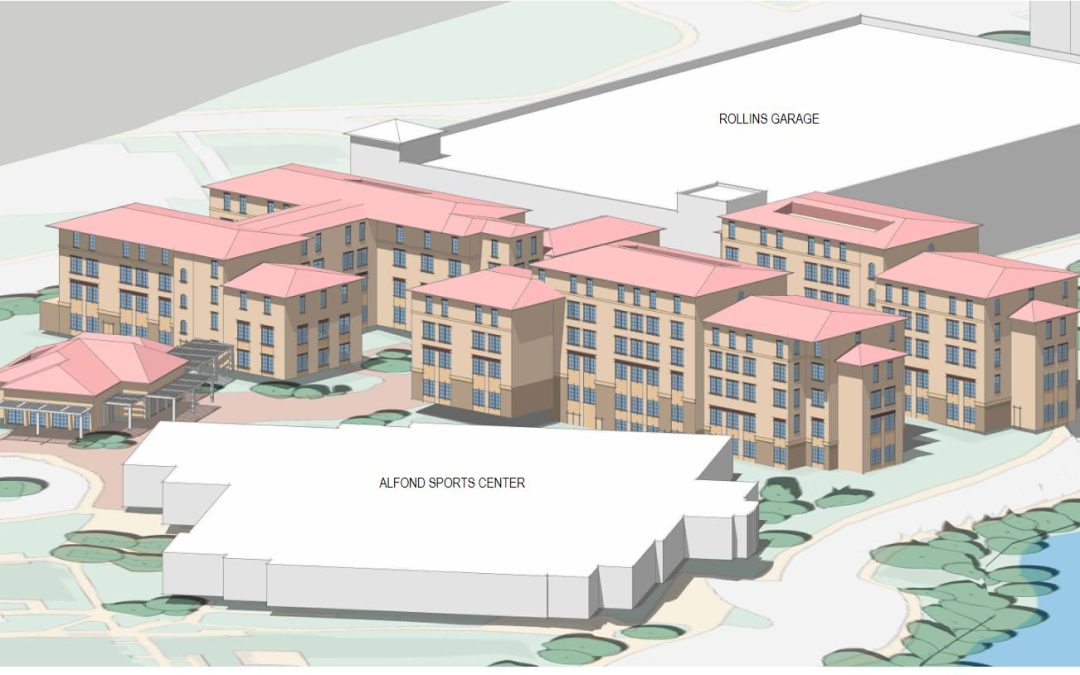
by Beth Kassab | Jan 13, 2024 | City Commission, News, Uncategorized, Zoning and Development
Updates on Rollins dorm, leaf-blower ban and Live Local Act
Angst over electric leaf blowers doesn’t stop ban set to start in July
Jan. 11, 2024
By Beth Kassab
Despite reservations over the logistics of enforcing a ban on gas-powered leaf blowers, the City Commission passed a rebate on electric version of the devices as the prohibition is set to take effect this summer.
The $50 rebate available to residents in the form of a credit on their utility bills is intended to help ease the transition.
But commissioners expressed concerns over how landscape companies would make the move.
Vice Mayor Sheila DeCiccio said she’s heard from landscapers who note they work from early in the morning until the evening with few breaks.
“They want to know about battery use,” she said. “What is the cost of the battery if they can’t recharge?”
Gloria Eby, director of natural resources and sustainability, said the city is working to prepare resources on cost comparisons and battery life.
“It becomes an upfront cost … with industry, you can’t discount that fuel has its cost,” she said. “When you do a comparison on fuel to upfront battery, then the investment is 10 months to a year, and you’ve paid off that battery cost.”
Mayor Phil Anderson noted that the ban was first enacted in 2022, but the city pushed the pause button on enforcement for 30 months until July of 2024 to give people time to prepare.
“We were really intentional about saying this was intended to allow people to make transition over a 30-month period,” he said. “I’m not sure how effective that wait period has been? … As a realist my guess is most people have not done this conversion and most contractors have not done this conversion.”
He urged city staff to take a lighter approach to enforcement with perhaps warnings and education before launching into fines.
City Manager Randy Knight said the intention is to educate residents and companies before any fines are issued.
“We don’t plan to drive around looking for violators, but we know we will get calls from people and will dispatch people immediately,” he said.
At the same meeting, Commissioners approved the plans for a new 300-bed dormitory on the Rollins College campus and observed a moment of silence for Rita Bornstein, a beloved former president of the college, who died last week.
Commissioners also approved an ordinance to help block abuse of the state’s Live Local Act when it comes to new projects billed as affordable housing.
WinterParkVoiceEditor@gmail.com
To comment or read comments from others, click here →
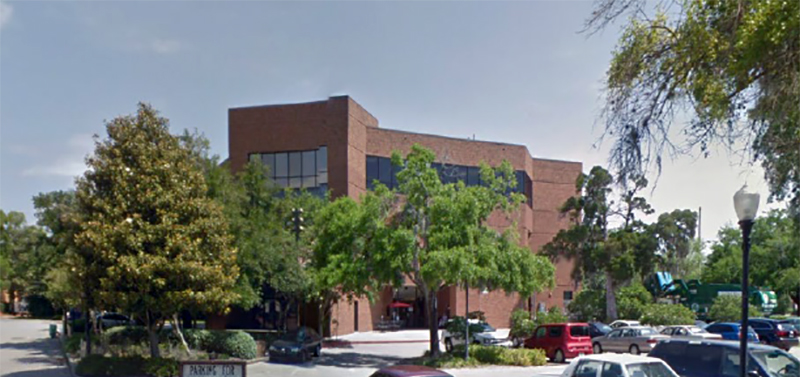
by Beth Kassab | Jan 12, 2024 | City Commission, Library, News, Uncategorized
Proposals for old library building fail again
The highly visible building off Aloma Avenue will remain vacant indefinitely as the City Commission considers what to do next
Jan. 12, 2024
By Beth Kassab
For the second time in a year, a proposal to transform the old Winter Park Library building on New England and Aloma Avenues has failed because of financial concerns.
City Commissioners voted 3-1 on Thursday against moving forward with the only plan that qualified for public discussion: a concept known as SOAR that billed itself as a space and science museum and learning center. Todd Weaver cast the dissenting vote.
Commissioners expressed concerns over the financial feasibility of the plan, which proposed to rent the building from the city under a long-term lease.
The decision lands the city back at the same position it found itself in a year ago — uncertain about the future of the building left empty when the new Winter Park Library on Morse Boulevard opened at the end of 2021.
Last year commissioners ended an exclusive deal with a developer to transform the old library into co-working space that also featured a café and event space.
A few months later, the commission opted to ask for another round of proposals for the site with a potential focus on workforce housing and providing workspace to local nonprofits. Only two proposals came in after commissioners pondered out loud during summer budget hearings about whether they should just sell the building to raise revenue instead. Ultimately, only the proposal for the museum met the qualifications for public discussion.
Spokeswoman Clarissa Howard said the next steps are likely to be discussed at an upcoming Commission meeting, though a date has not yet been set.
WinterParkVoiceEditor@gmail.com
To comment or read comments from others, click here →

by Beth Kassab | Jan 12, 2024 | City Commission, Election, News, Uncategorized
Wide gaps in campaign fundraising so far for mayor and commission seats
The first financial reports show who is winning the money race so far as the first candidate debates approach
Jan. 12, 2024
By Beth Kassab
The first fundraising reports for the period Oct. 1 through Dec. 31, 2023 are in and show two candidates bringing in cash at a far faster pace than their opponents.
Jason Johnson, an attorney and candidate for Seat 2 on the City Commission, has raised more than $24,000, the most of the five candidates in two races. He loaned about $1,600 of his own money to his campaign.
Stockton Reeves, the executive director at the Center for Public Safety, has raised about $6,300, including $3,000 he loaned his own campaign, and Winter Park High School teacher and coach Craig Russell, who is also running for Seat 2, has raised about $700.
Meanwhile, Mayoral candidate and current Commissioner Sheila DeCiccio raised $15,000, according to the filing. Her opponent, real estate school owner Michael Cameron, reported $310 in contributions, mostly in the form of his own contributions to himself.
With the March 19 election just over two months away, the public candidate forums are quickly approaching. The Winter Park Library will hold the first one for the Seat 2 candidates on Jan. 22. A second for the mayoral candidates will be held Feb. 8. The events are free and open to the public.
The Winter Park Chamber of Commerce will host a forum for all five candidates on Feb. 7, which is also free and open to the public.
WinterParkVoiceEditor@gmail.com
To comment or read comments from others, click here →

by Beth Kassab | Jan 5, 2024 | City Commission, News, Orange Avenue Overlay, Uncategorized, Zoning and Development
Winter Park tries to protect against abuse of state's Live Local Act
The city is taking a page from Tampa as it attempts to ensure projects provide affordable housing under state-mandated rules that are less stringent for developers
Jan. 4, 2024
By Beth Kassab
Last summer a new law took effect in Florida that appears designed to lure more developers to offer affordably-priced units as part of new projects.
But city and county leaders across the state are wary of the new rules known as the Live Local Act that take away local control over the projects — meaning the city would be forced to allow taller buildings or higher density than might typically be allowed under local regulations.
The Act overrides local zoning regulations for any housing project for which the developer declares a minimum of 40% of the units to be affordable, according to city documents.
Winter Park is just the latest local government to consider a set of provisions to try to guard against abuse of the act by attempting to ensure developers are truly providing affordable units.
The ordinance, which is based on one passed by the city of Tampa, will be considered for its second and final approval at Wednesday’s City Commission meeting.
In addition to clarifying some terms in the act, the proposed ordinance lays out an application and certification process to assure the developer continues to provide affordable units throughout the operation of the development.
“Otherwise, under the Act, one can declare that they are providing affordable housing but never demonstrate how they are doing such at any time during the initial approval process, during construction or operation for the 30 years required,” according to a memorandum from city staff. “There also are no penalties within the Act for non-compliance.”
Projects within the Orange Avenue Overlay District must also meet the applicable architectural requirements of the district and will be subject to review by Orange Avenue Overlay Appearance Review Advisory Board, according to the ordinance.
“The City may deny a project that receives a recommendation of denial or fails to meet the conditions of a recommendation for approval from the Orange Avenue Overlay Appearance Review Advisory Board,” according to the proposed rules.
WinterParkVoiceEditor@gmail.com
To comment or read comments from others, click here →









Recent Comments